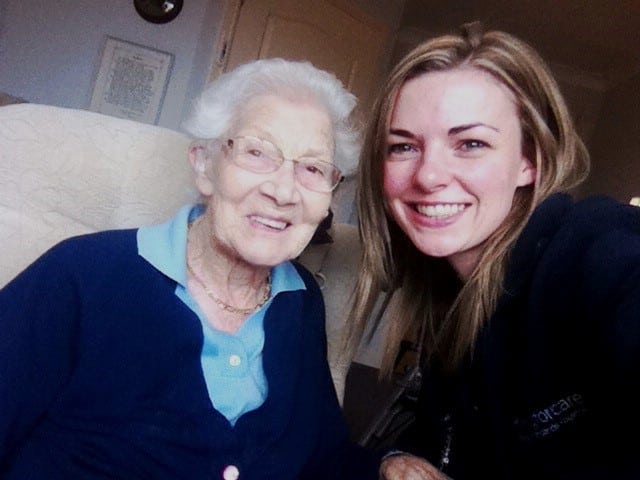Nursing Care: Building Meaningful Connections for Person-Centered Wellbeing

I am typing this as I dust off my open toe sandals and store away my winter coat. Brighter, sunnier, longer days = mood elevated and the feeling that anything is possible. I will continue where I left off and introduce you properly to Joyce. As the story unfolds you will hopefully see all the hard work that followed, since Joyce gave me that ‘lightbulb’ moment.
Building a Connection: The Meaningful Bond with Joyce
Joyce is a resident at a care home where I used to work. She enjoyed long chats, so I often stayed after medication to talk to her in a person-centred way. This wasn’t always possible at earlier times as I would also need to consider the other residents who were requiring medication. So sometimes this would mean Joyce would wait until last.
Joyce welcomed me into her world – sharing family photos and stories. Showing me her hand painted art and reading clippings of religious material which she made her think of me on my days off.
I in turn introduced Joyce into my world – showing her pictures of my dog, Sam and bringing him in to visit. Once I took a picture of a painting that was hanging in Joyce’s’ room, a wedding anniversary present which she is extremely fond of but knew little about. I then attempted to research its origin and background on line for her. I also often discussed issues I had with my partner Rob regarding the difficulties of being so far away from each other.
Joyce seemed to enjoy listening as much as she did talking and always offered a kind word of advice and would often ask how Rob and Sam are doing.
A Glimpse into Nursing: Balancing Work and Person-Centered Care
Within nursing I have found that if you are seen to be talking you are seen to be not working. I feel this is part of assessing and monitoring the person in your care albeit an informal method. What about person centred care, mental health and wellbeing, patient choice and job satisfaction? It seems that these are not always accounted for in the budget and staff numbers.
I have lost count of how many times I have said ‘…Won’t be a minute’. Apologising and then we would laugh that a nurse’s time zone is different from the rest of the world. I will also admit that I have asked other members of staff to come and get me. If I know that a certain family member/resident will keep me much longer than I can afford to give them.
This is not through malice or not being interested in stories but me trying to work in a way that is for the greater good. With Joyce it was a compromise of her wanting that time and me wanting to get medication administered within a reasonable time – that’s why we would chat after.
I would listen to how Joyce felt living in a care home and it very quickly emerged that it really was the small things that were important to her – a cup of tea when she would like it, a raised chair to help her see the view from her window, a chat and simply being treated with respect and dignity.
Empathy and Inspiration: Raising Standard in Care
I’m not sure I had ever listened to anyone as much as I had Joyce and to see things from a service user’s eyes, at times was upsetting. Not that Joyce was being mistreated like you see on Panorama but just missing out on the simple things which we take for granted … like being able to pop the kettle on… I have done it twice since typing this blog.
It was through conversations with Joyce and the staff group I was working with who would joke about an idealistic care home we called ‘Joyce’s Palace’. ‘Oh it won’t be like this in Joyce’s Palace’. ‘Oh this will certainly be happening in Joyce’s Palace’, ‘In Joyce’s Palace we will have x,y,z’.
This without realising it, was the start of my quest in developing an intensive, practical, relevant carer’s induction course.
Thank you for taking the time to read my blog.
Speak to you next month and… have the best day ever!
Jenna

Highlights from Jenna Story
Build meaningful Connections
- Person-Centred Care: Establishing meaningful connections with residents in care homes is vital. Taking the time to engage in person-centred conversations and activities can significantly enhance the quality of care. Learn more from our online personal centred care training.
- Individual Needs: Recognise that each resident has unique needs and preferences. For some, it may involve longer chats and sharing personal stories, while for others, it might be different.
- Respecting Personal Belongings: Residents often cherish their personal belongings. Sharing and showing interest in their family photos, artwork, or other possessions can help build trust and rapport.
- Reciprocity: Building a bond is a two-way street. Sharing your own life and experiences with the resident can further strengthen the connection.
Balancing Work and Person-Centred Care
- Work-Life Balance: In nursing, the perception of being too talkative may be associated with not working. However, maintaining a balance between providing person-centred care and completing necessary tasks is essential.
- Prioritising Care: Nurses often have limited time, and it’s crucial to prioritise care while also meeting the emotional and social needs of residents.
- Empathy: Empathy plays a significant role in healthcare. Understanding the resident’s perspective and making an effort to provide what’s important to them, even in small ways, can greatly enhance their well-being.
- Respect and Dignity: Treating residents with respect and dignity is fundamental to providing quality care. Simple gestures like a cup of tea, a comfortable chair, and respectful conversations can make a significant difference.
Empathy and Inspiration
- Seeing from the Service User’s Perspective: Listening to residents and seeing things from their perspective is crucial. Even the simplest things that we take for granted can have a significant impact on their quality of life.
- Improving Care: Conversations with residents and colleagues can inspire changes in care practices. The desire to create a more idealistic and person-centred care environment can lead to the development of improved training programs and induction courses for carers.
- Continuous Improvement: The quest to enhance the quality of care should be ongoing. Identifying areas where care can be improved and taking action to make positive changes is a vital aspect of healthcare.
Also Read:
Safeguarding Vulnerable Adults: Advocating for Their Protection.
Let us Help you
We’ll help you find the right course for your needs. Tell us a little bit about your situation and what you would like to achieve.
We’ll get back to you within one working day.
